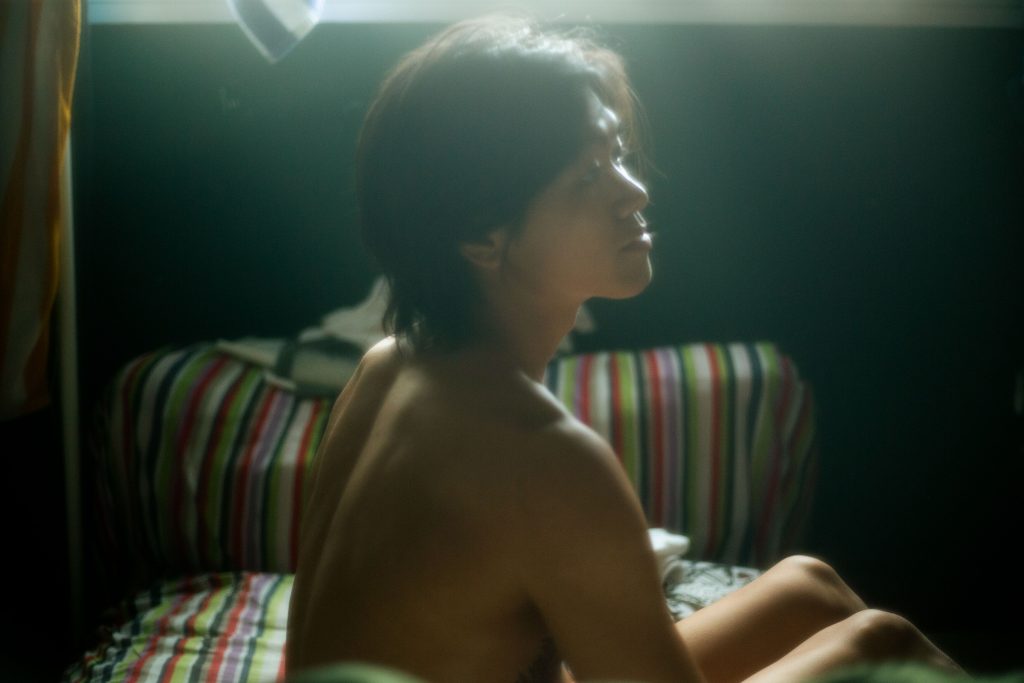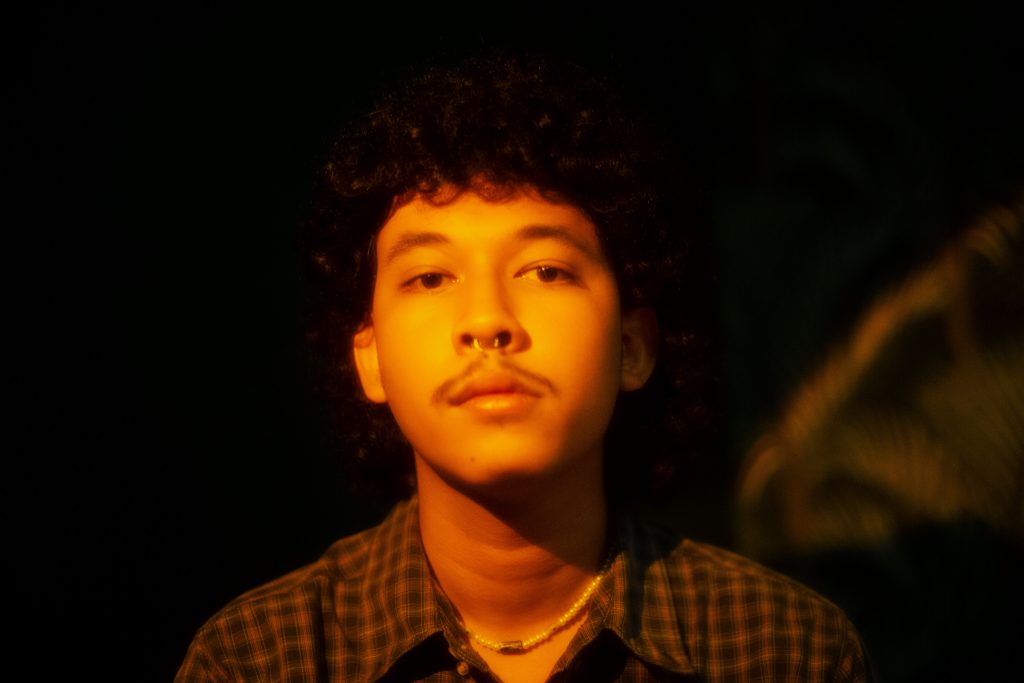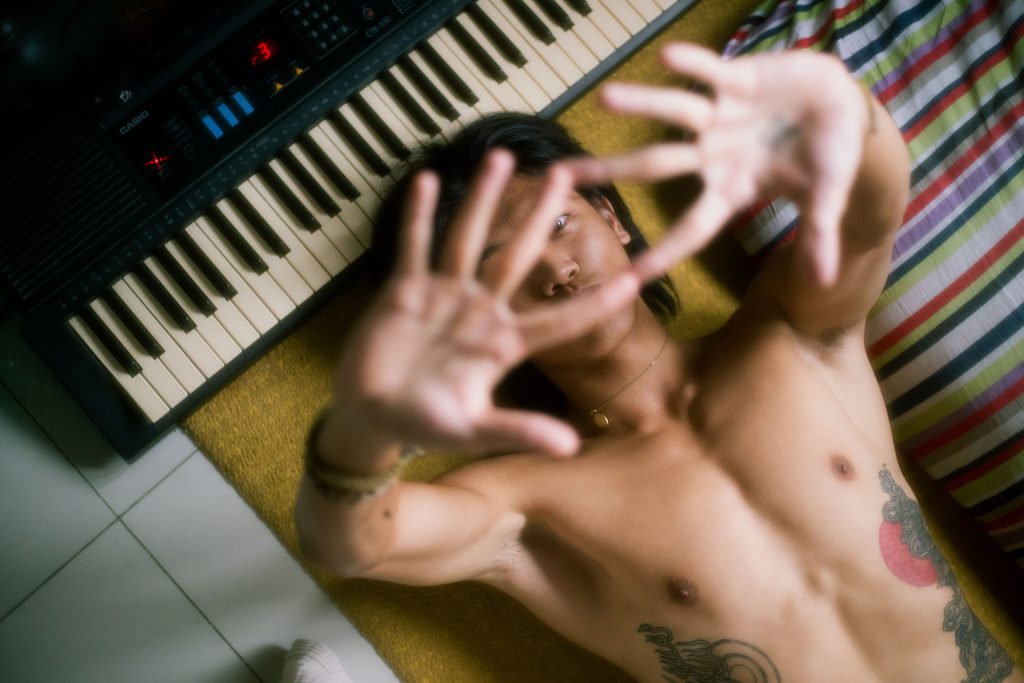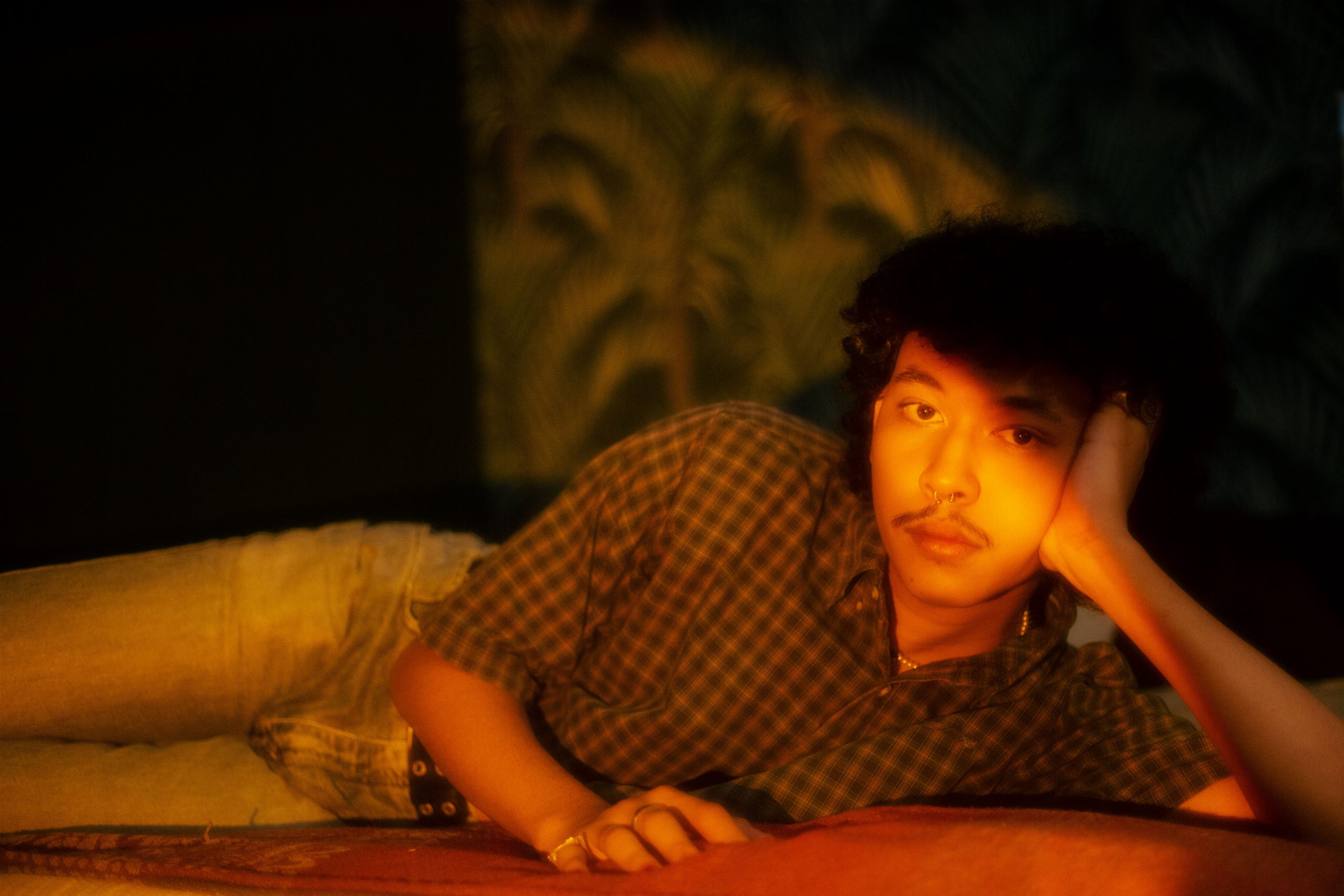Top image: Shahzan Ariz. Photography by Marisse Caine.
This is part one of a series of articles about Singaporean masculinity and how it is changing. In this episode we speak to Gen-Z boys who are confidently male, yet have an evolved idea of how this should be expressed. In the following episodes we will look at fatherhood, business execs, and fitness enthusiasts.
I was scrolling TikTok the other day when I chanced on a young Singaporean teen saying: “If you’re Chinese and you have a perm right … you must be gay.”
While he meant it as a joke, it’s a mindset many of us are all too familiar with—men who hate on other men for dressing up because it makes them ‘feminine.’ Moments later, I stumbled upon another young Singaporean guy responding to that first video: “You could literally breathe wrong and these people will be like ‘eh bro, that’s gay,’” he said.
“We get it, you’re insecure and you want everyone to know that you’re straight so you avoid anything remotely feminine and gay,” he continued.
From #MeToo in the US to the ‘masculinity crisis’ in China, there’s been a global push to question—or enforce—traditional notions of who men should be. And locally, we have seen similar debates sparked by the rampant cases of sexual assault ever year, or even by how local ‘bro culture’ has turned toxic, perfectly exemplified by the hazing incident at Ngee Ann Poly where boys urinated on each other.
Although I was thrown off by the fact that these jokes still get thrown around, like in the TikTok, seeing both videos get hundreds of comments and thousands of likes was proof that these debates are finally on the forefront of social discussions—especially among young people.
Why? Because masculinity is having a crisis.
Or, it can be seen as an evolution, the changes of which are most obvious amongst Gen-Z boys.
The debate has existed long before they were born, but in a way, Gen-Z boys have been forced to confront it in an unprecedented way. Being digital natives, they have grown up on platforms like Instagram and Tiktok where these discussions are common.
Like the responding guy on TikTok, I have seen an increasing number of Singaporean Gen-Z boys shredding toxic expressions of masculinity, for example, by showing vulnerability or dressing in ways men traditionally shouldn’t. And seeing them I wonder how, when being raised by a conservative generation, did they get to where they are?
Singaporean Masculinity

The ideal tropes of masculinity in Singapore can vary from race, religion, and age group, but there is a golden standard that seems to be pervasive: the successful career driven man that can support his wife, kids, and parents, while showing no signs of struggle or weakness.
When we asked our followers on the Rice Media Instagram page what they thought is considered unmanly in Singapore, multiple interesting responses came in. Many said that earning less than a female partner, or being supported by them, is unmanly. Others also said crying, caring about appearance, or caring about children can be seen as unmanly.
Overall, 86.7% of respondents said that they think Singaporean men are heavily impacted by toxic masculinity.
“I can only speak based on my own family experiences,” said 20-year-old Jonn O. in our interview, “but masculinity is providing for your family. It’s being the man of the house. It’s just how my dad has always been.”
The same sentiment was shared by 18-year-old Tristen Tio, who said he grew up being taught that one day he would have to become a ”responsible man of the house” that could take care of his siblings, future wife, and parents. And technically, one could argue that this vision is not necessarily bad, but it’s the way that boys are taught this as kids that is problematic.
“Growing up, when you get punished and you’re crying, you’re told to man up and stop. That’s bad because you’re not taught how to express yourself and you essentially start bottling things up,” Tristen shared.
Both Jonn and Tristen spoke about being forced to ‘man up’ time and time again and how it made that difficult for them to accept their weaknesses. And who was their role model of this? Their dads, because they embodied these teachings perfectly.
A Masculinity Crisis Is A Fatherhood Crisis

Fathers are every boy’s first role model, which is a double edged sword depending on what example they set for their kids. Almost all the boys I spoke to mentioned how they struggle to have constructive conversations with their fathers, let alone get to the point of questioning gender and identity with them.
When I asked Jonn why he can’t discuss masculinity with his dad, he said: “He’s just hard as fuck. You can’t crack him open. Any conversation like that he’ll just change the topic.”
But why is he (and so many other fathers) so adverse to discussing this?
“Repressed feelings, and no outlet to express himself—especially at an age where he’s kind of set.”
Basically, fathers are proof of what happens to men when they were taught since kids to man up—they struggle to access their soft, emotive side.
Telling your son to be a man implies that “a man is aggressive, emotionless and cannot cry,” said Dr Debmita Dutta, consultant and founder of What Parents Ask. “Parents need to realise that such an understanding of manhood can only harm their child in the process. Telling your son to be a man is a huge shortcut in parenting, without really understanding what he really wants.”
For 25-year-old Harry Nayan, getting in touch with his own emotions was a long and tedious process of introspection. He told me how as a child, his father was always very closed off emotionally. Essentially, he was a victim of his own beliefs of masculinity—he was focused on supporting the weight of his whole family on his shoulders by travelling and working long hours, while being ‘strong’ for those around him and showing no sign of weakness.
“My grandfather moved to Singapore from India and he had to work hard to build a life for his family here. The same pressure to be successful was put on my father, and then on to me,” Harry shared.
“I saw the toll it took on my dad, he was working so hard, travelling everywhere, holding up so much without ever saying he was struggling. I didn’t want to be like that. It’s so taxing to bottle everything in the long run.”
In a predominantly male household—Harry has two brothers—talking about feelings was rare, and by the time he hit his twenties, he struggled to do so at all. “Thanks to my ex-girlfriend and my current girlfriend, I was told I needed to open up and communicate more, which I have started doing.”

Generational Gaps
19-year-old Shahzan Ariz currently studies fashion at NAFA, but getting to where he is now has been a difficult process because of his dad, who has traditional expectations of masculinity. From young, he was taught that being a good Muslim man entailed having to “provide, be dominant, be respectful and be the main breadwinner.”
“I was always forced to play sports. Even if I like sports, it wasn’t something I wanted to do all the time.”
His father always thought fashion was a ‘gay’ and ‘feminine’ passion to have, and he even told Shahzan he wouldn’t be a good Muslim if he pursued it. He eventually forced him to enroll in Multimedia Infocomm Technology at Nanyang Polytechnic, where he persisted for barely a year before dropping out and enrolling into fashion school.
“He thinks because I’m into fashion, I paint my nails, and I wear crop tops and skirts, that it’s just a phase,” Shahzan shared. “And I can’t really talk to him or anyone in my family about this or about my emotions.”
“My dad has this egoistic thing where he doesn’t show emotions or can’t put himself down. I try to change my mindset to see his point of view, but he can never do that for us.”
Like Shahzan, many boys of the boys I spoke to have realised that the role their fathers play—an often purely disciplinary one with little emotional connection—is harmful in the long term.

In 2019, the first longitudinal study that observed the paternal involvement of Singaporean fathers was conducted, and it found that local social norms often lead to absent fathers. This is not entirely the fault of the men themselves, but of cultural beliefs that place the mother as the primary caregiver for children, and the father as the one to handle the more practical necessities.
Speaking to TODAY Online about the study, one man said that emotional needs of fathers are not discussed enough because “our society still sees men as being strong.” Over time, this causes men to feel trapped by the expectation of them to be strong and never crack.
And what we have seen with past generations, including many of our fathers, is how these beliefs turn into vicious cycles. The same issues that many fathers suffer from, like repressed feelings, are passed on to their own sons when raising them with strict gender roles. But now, with more open conversation on the matter, you could say it’s the first time we are seeing a drastic generational gap between young men and those who raised them.
The ‘Bros’ In School
The first taste of real life kids get outside of the house is in school.
In school, “kids who are assigned male at birth learn through playground fights and so forth to see the world through the prism of winners and losers,” explains feminist Jonn Stoltenberg. “The one who wins is the one who walks away with the manhood, and the one who loses is the one who is made invisible and is feminized.”
In boys’ schools, which are not uncommon in Singapore, this dynamic is even more present. Tristen brought up how in his secondary school, boys would compete over who had had sex first or who had more girlfriends.
“It’s a big thing and you gain peer respect if you have a girlfriend or if you have had sex,” Tristen said. “And at the time, of course, I followed the same beliefs. I thought it was really cool as well, because that’s what everyone thought.”

This ‘win-lose’ dynamic is also what leads to boys struggling to connect with one another on a deeper level. Suppressing emotions is seen as ‘manly,’ and many boys fear that showing affection to their peers will come off as ‘girly’ or ‘gay’.
Some would argue that this is ‘boys being boys,’ but the over-emphasis on fixed definitions of masculinity can often have more serious effects. In 2019, the Samaritans of Singapore (SOS) reported that suicides in Singapore are up 10%, and that the suicides rate of boys aged 10 to 19 are at a record high.
About the results, SOS senior assistant director Wong Lai Chun said that “we live in a society that stresses the importance of masculine qualities as a measure of success,” and that in men, “the slightest hint of vulnerability can be seen as an imperfection.”
Talking about his experience at an all boys school, Jonn said that “there was no real conversation. It was just us fucking around the entire time. Once we graduated, none of us actually kept contact with each other.”
“We didn’t develop a deeper understanding of each other. We didn’t recognise that we each had our own experiences and lives. It was just fun.”
National Service
One officially becomes a man once he has completed his national service (NS), right? Just look at Ah Boys To Men, one of Singapore’s most popular films, and what its title implies.
But it’s a pretty problematic notion, as it boils masculinity down to a simplistic set of traits the military teaches—patriotism, strength, aggression, and the win-lose dynamic I mentioned earlier.

“When I talk about NS, my family always says to ‘man up and go through with it like every other guy in Singapore has done,” Tristen said. “But I hate when people say that because if I don’t go through with it, does it mean i’m not a man?”
Similarly, Shahzan shared how on multiple occasions he has been mocked by other guys for not having served NS yet. “When I have conversations with other guys about NS, there’s always one guy who comes in and says, ‘Eh, don’t talk about this kind of stuff. You never go NS you don’t talk. You’re not man.’”
“Why does NS equal maturity? Why do you only become a man once you do NS? I can be mature or manly enough with or without NS.”
Ah Boys To Men perfectly exemplifies what happens when boys are put in a predominantly male environment for two years. The fourth installment of the series casted a female soldier as a lead, unleashing a flood of sexist comments in both the film itself and by audiences online. The female lead and the different female characters in the film are often left to deal with catcalling and sexist comments—i.e. when they call a woman a ‘fat-rarri’.
In 2017, writer Nelson Chong perfectly explained these problematic notions:
“They were the titular ‘ah boys’ who would be transformed into men. Three sequels on, the much-awaited evolution is nowhere to be seen … In a jaw-dropping minutes-long sequence, a long line of supercars form up to pick up a soldier who had been mocked and made fun of due to his slight obesity and awkward personality; and they drive off while the protagonists gape like 20-year-old recruits—no, more like pimply teenagers.”
How Fashion And Style Has Emancipated Gen-Z Boys
On one hand, fashion is a means for humans to express themselves. On the other, it’s also a tool for conformity and appeasing cultural expectations. Especially when it comes to gender, fashion has long been divided into an array of boxes divided by gender, stereotypes, and styles.
In Singapore, dressing like a man usually entails office wear or a polo shirt with berms/chinos. Even when dressing casually, it’s a t-shirt and shorts. While men don’t need to wear feminine clothing or dress androgynously to be liberated from toxic masculinity, Gen-Z boys are increasingly looking for the space to express themselves, including with style choices, without being judged or put in a box.
Slowly, this is happening. Every morning, the Gen-Z boys I spoke to make one crucial decision: to dress based on their personal taste, rather than by the expectations placed on them.
They also dabble with more extreme styles out of their comfort zone. Tristen told me about how he models as a side-gig, which often entails outfits and clothes that are out of the norm.

“Eh, why you dress like that, you gay ah?” is a comment he has gotten because of his modelling. “I know they are just trying to goof around, but there’s some truth that’s carried over with that statement. Like, they do believe it is gay.”
“I don’t see anything wrong with being mistaken as gay,” Tristen continued. “What are you trying to prove by calling me gay? What are you trying to say when I look gay? A gay guy can dress like any guy, like an office worker wearing a polo shirt. They don’t have to dress like girls to be gay.”
Despite his girlfriend encouraging him to wear crop tops and more androgynous clothes, he still doesn’t feel comfortable doing it out in public.
“It’s a really loud statement because it’s not something that’s normalized,” Tristen confessed. “People will stare and that’s when insecurities grow. I’m not in the headspace to not care yet.”
Tristen told me he wished key male figures in Singapore would have paved the way, especially older ones. If you look at popular culture, it’s pretty hard to spot more than a mere handful of men breaking out of conventional stereotypes of manliness. And even then, Tristen admitted it would be hard to get over the stares from strangers.
As someone who has tried to just ‘be myself’ when it comes to personal style, I completely understand where he’s coming from. I still remember the stares I got one of the first times I painted my nails. One morning, I was commuting on the MRT when an uncle sitting next to me spent the entire journey looking at my hands and shaking his head in disapproval.
For this reason, I have always complimented guys for dressing androgynously, even if they did it because it’s merely a trend. To me, what that does is just normalise apparel for being what it is—clothing—and not a statement to do with gender or sexuality.
“It can be horrible to paint your nails or wear skirts just because it’s a trend, but I also see the good side in it,” Shahzan said. “For every person that does it because it’s a trend, there’s someone else doing it because it makes them feel good about themselves, so it just normalises it.”
Does healthy masculinity exist?

One topic that’s come up repeatedly in my conversations with the different boys is whether healthy masculinity exists. The answer, unfortunately, is both yes and no.
Not all the traditional teachings of masculinity are bad, like providing, being responsible, being stable, strong, or successful. However, are these really qualities we should applaud only in men? Of course not. These are just traits of good human beings.
We can see that with the way women have started adopting these traits too in societies that are dismantling patriarchal norms. We don’t see women who are successful, career driven, and who support their children as ‘masculine.’ And I don’t think we should for men either. We should be judging each other on our values and how we are as humans, not on how well we conform to gender roles.
So as we move forward, maybe we shouldn’t be picking out what is healthy’ masculinity, but rather, shedding what we know is toxic about it. This way we create an environment where we are constantly questioning what is normal, accepted, or status quo, so we can be constantly moving and evolving.
Have you been impacted by traditional definitions of masculinity? Tell us at community@ricemedia.co.
And if you haven’t already, follow RICE on Instagram, Spotify, Facebook, and Telegram.








